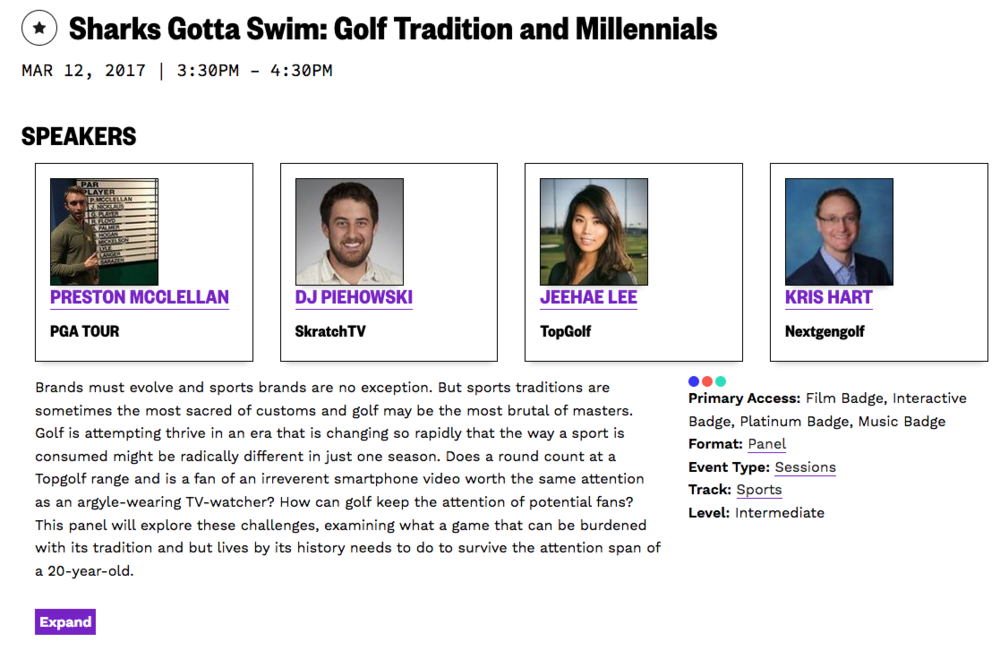We didn’t even get a week of enjoyment out of Tiger Woods’ uplifting Masters win before writers and analysts had to remind us how the the only people who matter prefer E Sports and soccer. Newsflash!
Conclusion: golf is doomed and might as well just fold up the tent.
It feels like we’ve done these stories for over a decade now. Sadly, the golf world listens and we’ve had to watch various businesses flush years of credibility, service and solid profits in a quest to reach this precious audience while neglecting others in the name of pursuing the previous M’s. Certainly there are issues for the sport, but you’d hope by now that the focus would shift from all that the sport is not able to achieve for the M’s and accept that golf is not the cause of issues preventing millennials from having the time or income to spend on a leisure activity. Or even pay their taxes.
So on the cusp of somewhat positive industry news released this week and signs that Topgolf has at least made the sport an aspiration for the M’s, we have the dreaded analysts telling us otherwise.
Lauren Silva Laughlin in the Wall Street Journal notes the lack of “contact and action that lures viewers” and the average age of golf’s television demo (65). She notes the usual stuff about course closures and M’s not taking up the sport. And even says Tiger just doesn’t have what it takes.
Sports’ star power is changing, too. The latest sports hero is a 27-year-old, blue-haired electronic gamer named Ninja, a player of the popular videogame “Fortnite.” He recently received his own figurine line and was named in Time’s 2019 list of 100 most influential people.
Even compared with athletes that move their heart rate beyond a resting state, golfers are old, relatively. The average player of baseball, another sport known as a less spry bunch, is 14 years Mr. Woods’s junior.
Looked at another way, the last millennial was born a year before Mr. Woods won his first Masters tournament in 1997, if Pew Research’s age benchmarks are used. When his extramarital scandal hit tabloids, they were rounding out junior high. Mr. Woods could be golf’s savior. More likely, though, in the eyes of a millennial, he’s just another aging putter.
Sheena Butler-Young was on top of the M’s narrative on Monday after the Masters and talks to various analysts who see no hope for the sport that dates to Mary Queen of Scots.
“There’s nobody in golf that’s totally capturing everybody’s imagination right now,” Poser said, adding that Puma athlete and PGA golfer Rickie Fowler has perhaps the biggest potential to draw in younger players. “The majority of the [sports’] fans aren’t the young fans. If you think about it, a lot of millennials don’t have the time and money to do it.”
Yes, we’ve known that a while but it doesn’t stop grown adults from making terrible decisions based on what their kids tell them at the dinner table.
Similarly, Powell counted a laundry list of reasons why millennials and Gen Z won’t take the baton from their parents and grandparents and carry golf into the future.
“The values of the game of golf just aren’t [akin] to the way millennials do sport: The rules are complicated. It takes a long time to play. It’s not inclusive. It’s not diverse. Representation of minorities is low. Golf courses smell like a chemical factory to keep them green. I could go [on],” he said, noting millennials and Gen Z aren’t likely to ditch their core values as they age and adopt the sport later.
Of course he’s not totally wrong on the values front, but we do know the industry has made huge changes in recent years on multiple fronts. Not to time it takes and probably not diversity, but golf courses are definitely not smelling like a “chemical factory” either.
The bigger question, how many more years do we have to endure these articles before we just focus on how Generation Z won’t take up or play golf? I don’t know about you, but I’m ready!

















